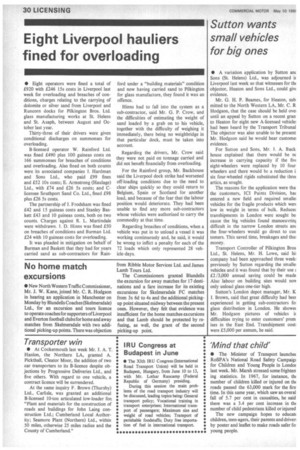Eight Liverpool hauliers fined for overloading
Page 32

If you've noticed an error in this article please click here to report it so we can fix it.
• Eight operators were fined a total of £920 with £246 15s costs in Liverpool last week for overloading and breaches of conditions, charges relating to the carrying of dolomite or silver sand from Liverpool and Runcorn docks for Pilkington Bros. Ltd. glass manufacturing works at St. Helens and St. Asaph, between August and October last year.
Thirty-three of their drivers were given conditional discharges on summonses for overloading.
B-licensed operator W. Rainford Ltd. was fined £490 plus 100 guineas costs on 166 summonses for breaches of conditions and overloading. Also fined on both counts were its associated companies I. Hardman and Sons Ltd., who paid £99 fines and £52 lOs costs; E. Armstrong (Haulage) Ltd., with £74 and £26 5s costs; and Clicensee Southport Sand Co. Ltd., fined £98 plus £26 5s costs.
The partnership of J. Frodsham was fined £42 and 15 guineas costs and Stanley Baskett £43 and 10 guineas costs, both on two counts. Charges against R. L. Martindale were withdrawn. J. D. Hinns was fined £50 on breaches of conditions and Burman Ltd. £24 with 10 guineas costs for overloading.
It was pleaded in mitigation on behalf of Burman and Baskett that they had for years carried sand as sub-contractors for Rain ford under a "building materials" condition and now having carried sand to Pilkington for glass manufacture, they found it was an offence.
Hinns had to fall into the system as a sub-contractor, said Mr. G. P. Crow, and the difficulties of estimating the weight of sand loaded by a grab on to his vehicle, together with the difficulty of weighing it immediately, there being no weighbridge in that particular dock, must be taken into account.
Regarding the drivers, Mr. Crow said they were not paid on tonnage carried and did not benefit financially from overloading.
For the Rainford group, Mr. Backhouse said the Liverpool dock strike had worsened off-loading conditions due to the need to clear ships quickly so they could return to Belgium, Spain or Scotland for another load, and because of the fear that the labour position would deteriorate. They had been unable to find any more sub-contractors whose vehicles were authorized to carry the commodity at that time.
Regarding breaches of conditions, when a vehicle was put in to unload a vessel it was working continuously and, he said, it would be wrong to inflict a penalty for each of the 72 loads which only represented 28 vehicle-days.












































































































